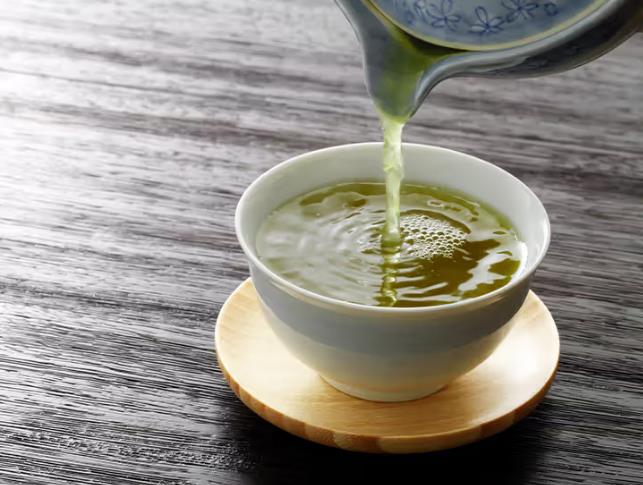Content Menu
● What is Green Tea Extract?
>> Composition of Green Tea Extract
>> Forms of Green Tea Extract
● Health Benefits of Green Tea Extract
>> Antioxidant Properties
>> Heart Health
>> Weight Management
>> Brain Health
>> Skin Health
>> Cancer Prevention
>> Diabetes Management
>> Liver Health
>> Immune System Support
>> Oral Health
● Potential Side Effects
● Recommended Dosage
● How to Incorporate Green Tea Extract into Your Diet
● Conclusion
● Frequently Asked Questions
>> 1. What are the main components of green tea extract?
>> 2. How does green tea extract help with weight loss?
>> 3. Can I take green tea extract if I am sensitive to caffeine?
>> 4. Is there a risk of liver damage from taking green tea extract?
>> 5. How long does it take to see benefits from taking green tea extract?
● Citations:
Green tea extract is a concentrated form of green tea, derived from the leaves of the "Camellia sinensis" plant. It is rich in antioxidants and has been linked to numerous health benefits. This article explores the composition, benefits, potential side effects, and uses of green tea extract, providing a comprehensive overview for those interested in this popular supplement.

What is Green Tea Extract?
Green tea extract is made by steeping the leaves of green tea in water and then drying them to concentrate the beneficial compounds. The most significant of these compounds are polyphenols, particularly catechins, which are powerful antioxidants. The most studied catechin is epigallocatechin gallate (EGCG), known for its health-promoting properties.
Composition of Green Tea Extract
- Catechins: These are the primary antioxidants found in green tea extract. They help combat oxidative stress and inflammation in the body.
- Caffeine: Green tea extract contains caffeine, which can provide an energy boost and enhance mental alertness.
- L-theanine: This amino acid promotes relaxation without drowsiness, balancing the stimulating effects of caffeine.
Forms of Green Tea Extract
Green tea extract is available in various forms:
- Capsules: A convenient way to consume concentrated doses.
- Powder: Can be mixed into beverages or smoothies.
- Liquid extracts: Often used in dietary supplements and energy drinks.
Health Benefits of Green Tea Extract
The health benefits associated with green tea extract are extensive and supported by scientific research.
Antioxidant Properties
Green tea extract is renowned for its high antioxidant content. Antioxidants help neutralize free radicals, reducing oxidative stress and lowering the risk of chronic diseases such as cancer and heart disease.
Heart Health
Research indicates that green tea extract can improve cardiovascular health by:
- Lowering total cholesterol levels.
- Reducing LDL (bad) cholesterol.
- Improving blood pressure levels.
In one study, participants who consumed 379 mg of green tea extract daily showed significant improvements in their cholesterol profiles compared to a placebo group.
Weight Management
Green tea extract may aid in weight loss by enhancing metabolism and promoting fat oxidation. Studies suggest that it can help burn fat during exercise. Although results can vary, combining green tea extract with a healthy diet and exercise may lead to modest weight loss.
Brain Health
The catechins in green tea extract have been shown to protect brain cells from oxidative stress, potentially reducing the risk of neurodegenerative diseases such as Alzheimer's and Parkinson's. Some studies suggest that it may enhance cognitive function and memory.
Skin Health
Green tea extract is often included in skincare products due to its anti-inflammatory properties. It can help treat acne, reduce signs of aging, and protect against sun damage. When applied topically, it has been shown to improve skin conditions like rosacea and dermatitis.

Cancer Prevention
While more research is needed, some studies suggest that the polyphenols in green tea extract may inhibit the growth of cancer cells. Regular consumption has been linked to a lower risk of various cancers, including breast, prostate, and colorectal cancer.
Diabetes Management
Green tea extract may help regulate blood sugar levels and improve insulin sensitivity, making it beneficial for individuals with type 2 diabetes. Some studies indicate that it can lower fasting blood glucose levels.
Liver Health
Emerging research indicates that green tea extract may support liver health by reducing inflammation and oxidative stress. In one study involving patients with non-alcoholic fatty liver disease (NAFLD), participants who consumed high amounts of catechins showed significant improvements in liver fat content and overall liver function.
Immune System Support
The antioxidants found in green tea extract may enhance immune function by promoting the activity of immune cells. This could potentially lead to a reduced risk of infections and improved overall health.
Oral Health
Green tea extract has antibacterial properties that can help reduce harmful bacteria in the mouth. This can lead to improved oral health by decreasing the risk of cavities and gum disease. Some studies suggest that rinsing with green tea extract may help reduce plaque formation.
Potential Side Effects
While green tea extract is generally safe for most people when consumed at recommended doses, it can cause side effects in some individuals:
- Caffeine Sensitivity: Those sensitive to caffeine may experience anxiety, insomnia, or heart palpitations.
- Gastrointestinal Issues: High doses can lead to stomach upset or nausea.
- Liver Toxicity: Excessive consumption has been linked to liver damage in rare cases.
It is advisable to consult with a healthcare provider before starting any new supplement regimen, especially for individuals with pre-existing health conditions or those taking medications.
Recommended Dosage
The typical dosage for green tea extract varies depending on individual needs and product formulations but generally ranges from 250 mg to 500 mg per day. It is best taken with food to enhance absorption and minimize gastrointestinal discomfort.
How to Incorporate Green Tea Extract into Your Diet
Incorporating green tea extract into your daily routine can be straightforward:
- Start Slowly: If you're new to green tea supplements, begin with a lower dose to assess tolerance.
- Combine with Healthy Lifestyle Choices: For optimal results, combine supplementation with a balanced diet rich in fruits, vegetables, whole grains, and regular physical activity.
- Stay Hydrated: Drink plenty of water throughout the day to support overall health and well-being.
Conclusion
Green tea extract offers a wealth of health benefits due to its rich antioxidant content and various bioactive compounds. From promoting heart health and aiding weight loss to enhancing brain function and improving skin conditions, it serves as a valuable addition to a balanced diet. However, like any supplement, it should be used judiciously to avoid potential side effects. Consulting with a healthcare professional before incorporating green tea extract into your routine is recommended for optimal safety and effectiveness.

Frequently Asked Questions
1. What are the main components of green tea extract?
Green tea extract primarily contains catechins (especially EGCG), caffeine, and L-theanine.
2. How does green tea extract help with weight loss?
Green tea extract enhances metabolism and promotes fat oxidation during exercise, which can contribute to weight loss when combined with a healthy diet.
3. Can I take green tea extract if I am sensitive to caffeine?
If you are sensitive to caffeine, you should approach green tea extract cautiously or choose decaffeinated options.
4. Is there a risk of liver damage from taking green tea extract?
While generally safe at recommended doses, excessive consumption of green tea extract has been linked to liver toxicity in rare cases.
5. How long does it take to see benefits from taking green tea extract?
Many studies have shown benefits within 8-12 weeks of regular supplementation at appropriate doses.
Citations:
[1] https://www.frontiersin.org/journals/nutrition/articles/10.3389/fnut.2022.1084455/full
[2] https://pmc.ncbi.nlm.nih.gov/articles/PMC2855614/
[3] https://www.healthline.com/nutrition/10-benefits-of-green-tea-extract
[4] https://www.drugs.com/npp/green-tea.html
[5] https://www.medicinenet.com/egcg_epigallocatechin_gallate_benefits_dosage/article.htm
[6] https://pmc.ncbi.nlm.nih.gov/articles/PMC6412948/
[7] https://health.clevelandclinic.org/green-tea-extract-a-better-way-to-boost-energy-or-not
[8] https://www.mountsinai.org/health-library/herb/green-tea
[9] https://examine.com/supplements/green-tea-extract/
[10] https://www.elo.health/articles/green-tea-extract-supplements/






























